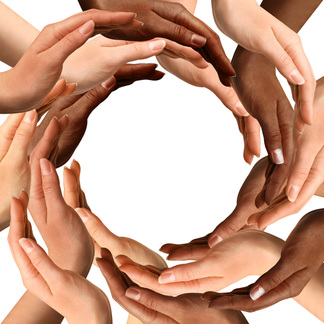
We human beings, of course, are social animals. We thrive in groups. We often discover our greatest potential by being part of a group. But there is a power to groups that goes beyond the experience of social bonding, efficient division of labor, and economies of scale. When a group is really working right, we can experience the group itself as an organism that has an energy, a power and a soul all its own. Being part of such a group transforms and transports each individual member into a new way of being. It can bring us in touch with eternity.
This week's Torah portion, Vayakhel, can be read as a meditation on the experience of being part of such a group. The portion opens with Moses bringing the people together into a group: "Moses then convoked the whole Israelite community…" (Exodus 35:1). Moses repeats to the people the laws of Shabbat, which they had heard before: "On six days work may be done, but on the seventh day you shall have a Shabbat of complete rest, holy to Adonai" (Exodus 35:2). Moses then instructs them to bring voluntary gifts for the building of the Tabernacle, which they also had heard before: "Take from among you gifts to Adonai, everyone whose heart is so moved" (Exodus 35:5).
There is a puzzle in this opening of the Torah portion. What is the connection between Shabbat and the building of the Tabernacle? Why does Moses put them together like this? Why are these instructions – which had been given in almost identical wording earlier in the book of Exodus – repeated here near the book's end?
The Izbitzer Rebbe (Rabbi Mordechai Yosef Leiner, 1804-1854), wrote in his great work, Mei HaShiloach, that the connection has to do with the transcendent experience of being part of a group. Shabbat, he says, is the great Jewish experience of being part of something beyond yourself. He even claims that the very word "Shabbat" is synonymous with intention of living, not for your own sake, but for the sake of heaven. Shabbat, to the Izbitzer, is merging your life with the life of the universe and knowing yourself to be just a piece in the puzzle which is God.
And what of the building of the Tabernacle? The Izbitzer says that, "With the building of the Tabernacle, all the hearts of Israel were united. At first, everyone did his or her particular job on the Tabernacle, and felt good about what they had done. However, it was only when they saw how all the different parts of the Tabernacle fit together so perfectly that they saw that it was as if it all had been made by one hand."
The Izbitzer goes on to say, "If so much as one nail had been missing, God's presence would not have been able to rest on the Tabernacle. No one, therefore, could feel in any way superior to another. Even the person who made the Holy Ark could not feel superior to the person who made the tent pegs."
This is an experience of God that is familiar to anyone who has been part of a group that is greater than the sum of its parts. When we connect with others, discover our own best selves in the reflection of others, create something wonderful and beautiful with others, we can feel that we have touched the infinite and communed with the holy. We even may have the sense of losing our individuality and see each other – just as we truly are – as pieces of the same whole.
That is why the Torah portion begins by saying, "Moses then convoked the whole Israelite community." When we come together with an intention of holiness – even if it is to do something mundane that we have done a million times before – we are building a Tabernacle in our souls, a place to come close to God.
Other Posts on This Topic:
Bringing the People Together
Vayakhel: Being Part of Something Bigger

 RSS Feed
RSS Feed
